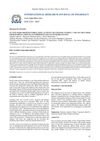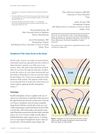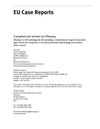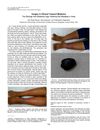 30 citations,
September 2005 in “Best Practice & Research Clinical Rheumatology”
30 citations,
September 2005 in “Best Practice & Research Clinical Rheumatology” The document concludes that treating tough skin disease in lupus involves sun protection, steroids, antimalarials, and various other therapies chosen based on individual risks and benefits.
 24 citations,
March 2015 in “Best Practice & Research in Clinical Obstetrics & Gynaecology”
24 citations,
March 2015 in “Best Practice & Research in Clinical Obstetrics & Gynaecology” Some skin conditions are common during pregnancy and can be safely treated without affecting the pregnancy outcome.
 11 citations,
November 2021 in “BMJ Open”
11 citations,
November 2021 in “BMJ Open” People with alopecia areata have higher rates of mental health issues, autoimmune diseases, and infections.
 7 citations,
January 2018 in “Medicinski arhiv”
7 citations,
January 2018 in “Medicinski arhiv” A herbal extract may help treat certain types of hair loss by reducing a specific gene's activity.
 1 citations,
October 2018 in “International research journal of pharmacy”
1 citations,
October 2018 in “International research journal of pharmacy” Rampai leaves extract can significantly stimulate hair growth.
 1 citations,
December 2015 in “Dermatologic Surgery”
1 citations,
December 2015 in “Dermatologic Surgery” Double trichophytic closure effectively treats thin scalp scars and reduces patient costs.
 December 2023 in “Dermatology and therapy”
December 2023 in “Dermatology and therapy” Japanese patients and physicians often disagree on the severity of Alopecia Areata and treatment satisfaction, needing better communication and treatments.
 July 2007 in “Journal of Generic Medicines”
July 2007 in “Journal of Generic Medicines” The UK High Court revoked Lundbeck's patent for Escitalopram, and second medical use claims based on dosage were not considered novel.
 370 citations,
September 1999 in “The New England Journal of Medicine”
370 citations,
September 1999 in “The New England Journal of Medicine” Finasteride and minoxidil are effective for hair loss, but continued research is needed for better treatments.
 18 citations,
March 2014 in “Current Pharmaceutical Biotechnology”
18 citations,
March 2014 in “Current Pharmaceutical Biotechnology” Metformin helps regulate menstrual cycles, induce ovulation, and improve pregnancy outcomes in women with PCOS.
 11 citations,
April 2015 in “International Journal of Cosmetic Science”
11 citations,
April 2015 in “International Journal of Cosmetic Science” Adenosine helps grow thicker hair in Japanese men with hair loss.
 3 citations,
May 2016 in “Gynecological Endocrinology”
3 citations,
May 2016 in “Gynecological Endocrinology” Low-dose flutamide improved hirsutism and satisfaction in women but had common side effects, causing some to stop treatment.
 3 citations,
January 2012 in “Elsevier eBooks”
3 citations,
January 2012 in “Elsevier eBooks” Burn scars form abnormally due to changes in wound healing, and more research is needed to improve treatments.
 November 2021 in “American Journal of Tropical Medicine and Hygiene”
November 2021 in “American Journal of Tropical Medicine and Hygiene” Marking nuts can cause skin irritation and allergies.

Integrin alphavbeta6 is important for wound healing and hair growth, and blocking it may improve these processes.
 6 citations,
February 2010 in “Journal of The American Academy of Dermatology”
6 citations,
February 2010 in “Journal of The American Academy of Dermatology” A woman had a rare skin condition with recurring painful nodules that heal in 6 weeks, often without needing treatment.
 2 citations,
January 2005 in “Elsevier eBooks”
2 citations,
January 2005 in “Elsevier eBooks” The document describes skin diseases affecting the outer ear in dogs and cats, their spread to other body parts, and treatment options.
 1 citations,
October 2023 in “Life science alliance”
1 citations,
October 2023 in “Life science alliance” Pantethine may boost the immune system's ability to fight sarcoma.
 May 2024 in “KIU journal of health science”
May 2024 in “KIU journal of health science” Kolaviron and quercetin may help treat prostate issues.
 June 2022 in “Evidence-based complementary and alternative medicine”
June 2022 in “Evidence-based complementary and alternative medicine” Acupressure improves quality of life in PCOS patients.
 2 citations,
May 2023 in “bioRxiv (Cold Spring Harbor Laboratory)”
2 citations,
May 2023 in “bioRxiv (Cold Spring Harbor Laboratory)” Sebaceous glands can heal and regenerate after injury using their own stem cells and help from hair follicle cells.
 June 2024 in “International journal of nanomedicine”
June 2024 in “International journal of nanomedicine” Azelaic acid micro/nanocrystals, especially with ultrasound and salicylic acid, greatly improve acne treatment.

Avicennia marina extract and avicequinone C can potentially promote hair growth and treat hair loss by interfering with hair loss mechanisms and boosting growth factors.
 3 citations,
June 2004 in “Alternative and Complementary Therapies”
3 citations,
June 2004 in “Alternative and Complementary Therapies” The document concludes that hair loss is influenced by genetics and other factors, and while treatments like finasteride can help, they have limitations and side effects.
 13 citations,
January 2010 in “Advances in Biochemical Engineering / Biotechnology”
13 citations,
January 2010 in “Advances in Biochemical Engineering / Biotechnology” Understanding hair biology is key to developing better treatments for hair and scalp issues.
 August 2023 in “Journal of The American Academy of Dermatology”
August 2023 in “Journal of The American Academy of Dermatology” Early treatment is key for permanent hair loss disorders, with options ranging from medications and phototherapy to immunomodulators and antibiotics, depending on severity and type.

Surgeons should evaluate new technologies critically, offer a range of services including non-surgical options, and be aware of marketing influences to meet patient needs and maintain a successful practice.
 January 1993 in “Side effects of drugs annual”
January 1993 in “Side effects of drugs annual” Natural products like propolis are causing more skin allergies, and certain skin treatments and medications have various side effects and risks.
 109 citations,
September 2011 in “Human molecular genetics online/Human molecular genetics”
109 citations,
September 2011 in “Human molecular genetics online/Human molecular genetics” New treatments targeting specific genes show promise for treating keratin disorders.
 25 citations,
May 2019 in “Heliyon”
25 citations,
May 2019 in “Heliyon” Hair treatments cause significant structural changes, especially with excessive heat, regardless of ethnicity.





























